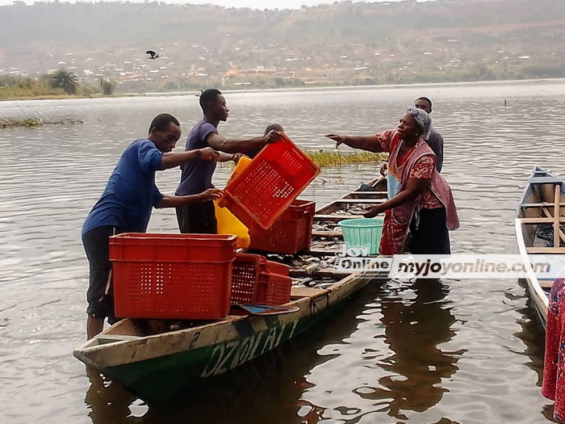After a long and tiring day, fish farmers now draw closer to the river banks with bountiful harvests of tilapia to serve their longsuffering customers.
Traders and customers rush in with their baskets and bowls to listen to their names being called out by the record keepers so they can have their turn and purchase their fish.
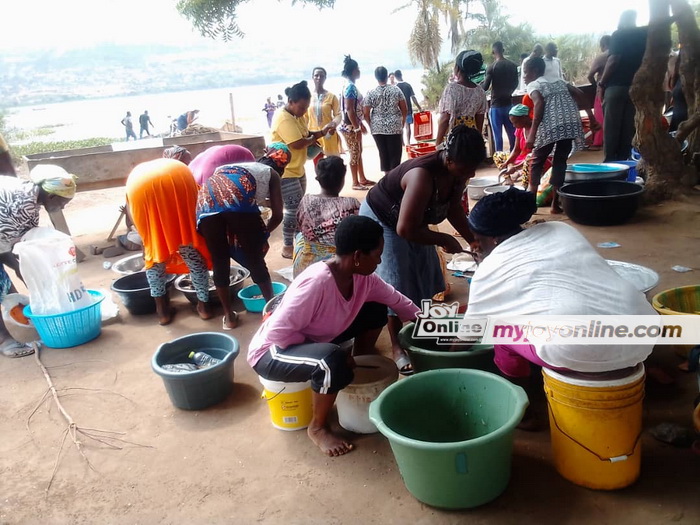
Before the fishes are sold out after harvesting, record keepers would have noted in advance how much each trader or customer intended to purchase.
Nathaniel is a record keeper. According to him, he comes in the morning and records the names of the traders who want to purchase the fish. He gives them a number (as an identity), and when the fish farmers arrive, he calls out the numbers in accordance with first to arrive, and the fish is weighed for the trader.

Tilapia is the main type of fish cultured by most fish farmers at Joma, near Ablekuma in the Ga West Municipality of the Greater Accra region. People from different locations like East Legon, Winneba and Nsawam come to purchase tilapia at Joma. Per their own stories, this has been a great means of survival for most of them.
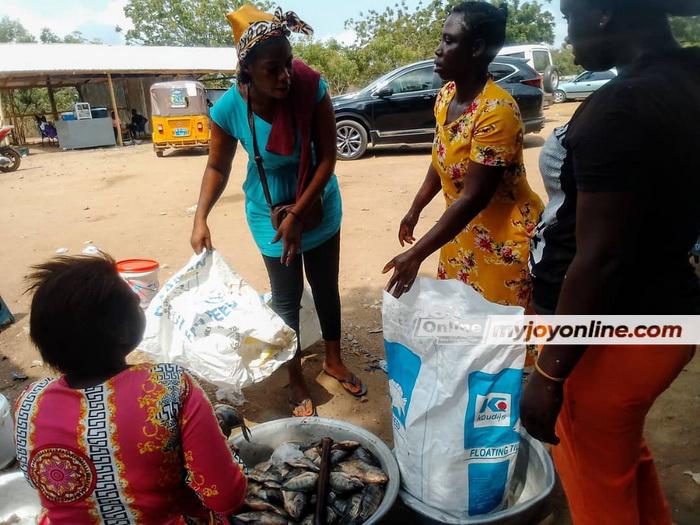
Vida Baidoo, a young lady who sells tilapia as her business said that she comes from East Legon to buy tilapia because she heard it is less expensive and always fresh at Joma.
Joma is big when it comes to fishing. Its lack of popularity in the recent past has rapidly given way, now attracting people from far and near into the tilapia business.
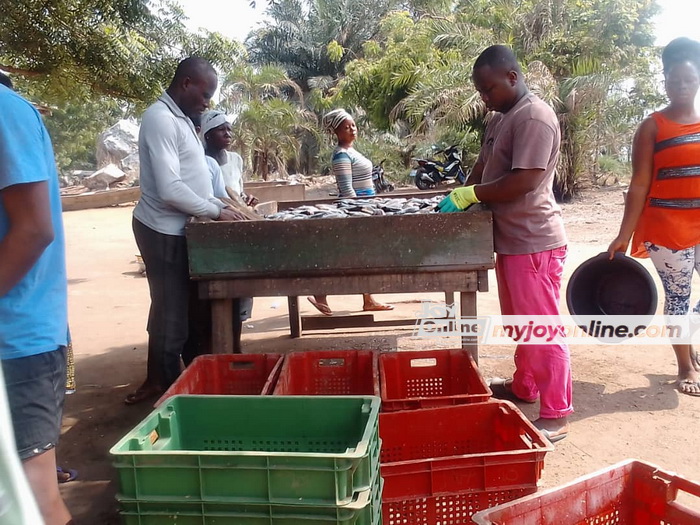
Richard Amebor has been in the business for the past 12 years and he complains bitterly about the relatively high cost of setting up a fish farming business. Plus, "you also need to have a business heart to do this kind of job", he said, explaining that because at times you invest in it and you get nothing in return.
According to him, fingerlings cost 20 pesewas each. And there is the cost of constructing ponds, plus feeding. These fingerlings are reared and fed for a duration of five to six months.
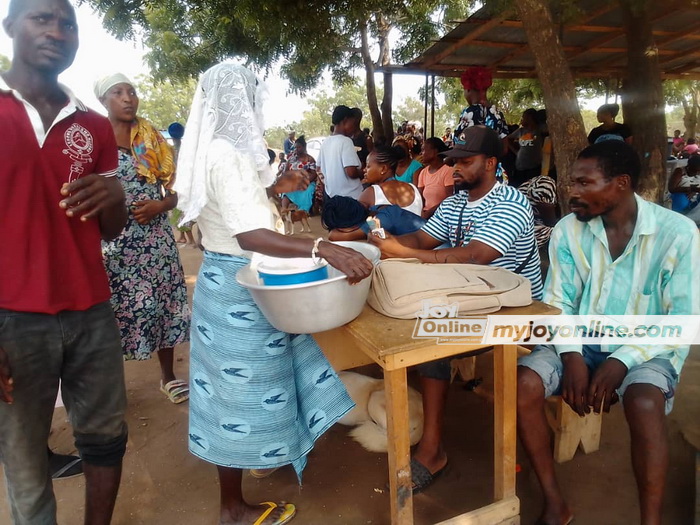
In the course of time, some of the fishes die, due to contamination in the river or some other causes. During the rainy seasons, the dam may overflow into the river, killing or carrying some of the fishes.
There is also theft of fishes, which usually occur in the still of the night when everyone retires home to rest. This is why they felt the need to put up a structure and hire guards to protect the fishes at night.
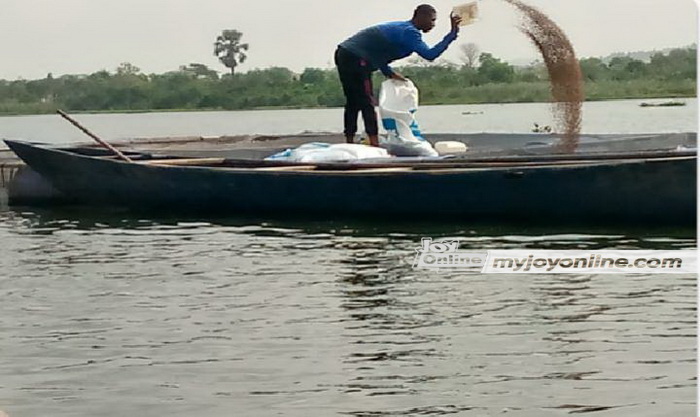
Richard Amebor won the best fisherman in 2020 and repeated the feat in 2022.
He counsels that the fingerlings must be fed three times daily to keep them healthy and strong for a good harvest and return, as well as serve customers with healthy fishes.
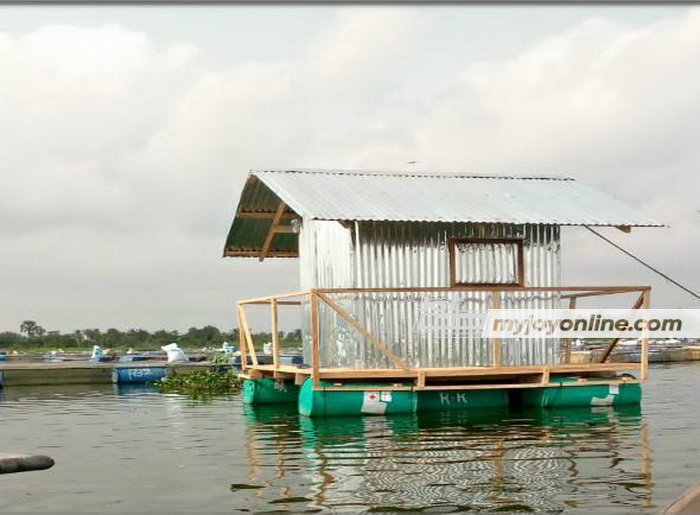
.
Latest Stories
-
‘It’s unfortunate we had to protect the public purse from Akufo-Addo’ – Ablakwa on ORAL Team’s mission
33 minutes -
Congo lawyers say Apple’s supply chain statement must be verified
59 minutes -
Stampede in southwestern Nigerian city causes multiple deaths
1 hour -
Tens of thousands without water in Mayotte as curfew brought in
2 hours -
ORAL: We won’t witch-hunt, we’ll focus on transparency, not revenge – Ablakwa
2 hours -
Attempted robbery: Accused claims he carried cutlass for protection
2 hours -
Excavator operator jailed for stealing
2 hours -
African fans age-shame me for putting on some outfits – Tiwa Savage
3 hours -
Tiwa Savage criticised by female fans for stance on cheating in relationships
3 hours -
Bank of England expected to hold interest rates
3 hours -
Congo river boat sinks killing at least 22
3 hours -
Nigeria approves Shell’s $2.4 billion asset sale to Renaissance
4 hours -
Embattled Liberian speaker questioned by police over parliament fire
4 hours -
‘I won’t be a judge in my own court; ORAL is about protecting public purse’ – Ablakwa
5 hours -
Bawumia joins thousands in Kumasi for burial prayers for Ashanti Regional Imam
5 hours

